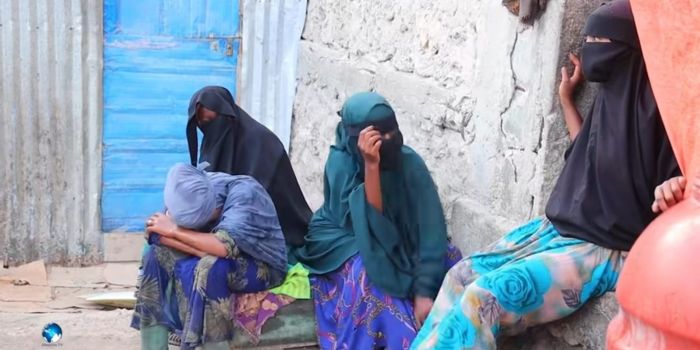In the Warta Nabada district of Mogadishu, Somalia, four sisters have unexpectedly become a symbol of resilience and unity through their efforts to support their family.
Samira, Amran, Shukri, and Hindiya Abdi was tuk-tuks, a job traditionally reserved for men. Their story has garnered widespread attention, as many are astonished by women undertaking such labor-intensive work, which involves tilting the vehicles to clean their undersides.
Driven by the need to provide for their loved ones, the sisters wake up early each day and head to their workstations with their father who accompanies them despite their old age.
Abdi Ali and his daughters spoke to the media on Friday after a video of the girls at work went viral. He acknowledged the unusual nature of the work his daughters do but said they have no choice.
“I was forced by circumstances,” he said in a Universal TV interview, explaining that he needs his daughters’ help as he has no sons. They passed away and the family did not give details of the circumstaces.
KEEP READING:
- Breakthrough in South Sudan Peace Initiative as Stakeholders Commit to Mediation
- Tanzania Says Tropical Cyclone Hidaya Has Lost Its Strength
The family has been in this business for four years, with the daughters joining one by one-first Samira, then Amran, followed by Shukri, and finally Hindiya.
The toll the work takes is evident, with Abdi noting that his children often complain of back pain and fatigue.
“They all complain at night of back pain and fatigue,” he said, adding, however, that they all persevere.
Some customers and passersby often ask Abdi to stop his daughters from doing the work and hire men instead, but that would add to their financial distress.
Samira, the eldest daughter, admitted that washing the vehicles is difficult but explained that she does it to support her father and help the family.
“I am my father’s son. I have to do what a son would do to help him,” she said, adding that she resolved to assist after his abdominal surgery and the deaths of their brothers.
Samira also spoke of the societal judgement they face-pedestrians often mock them, suggesting they should be performing more traditionally female roles.
She mentioned they are frequently told, “You are a lady; go work at home and stop washing tuk-tuks like men.” Despite this, they remain undeterred driven by their dedication to their family.
The sisters sometimes work in shifts, with two working at a time, to manage the workload and allow each of them time for rest.
Abdi expressed deep sadness when he sees other young girls attending school, as he cannot afford to educate his daughters. “How can I take them to school? We are hungry and need to work,” he says.
Some drivers praise the family, saying their service is excellent.


